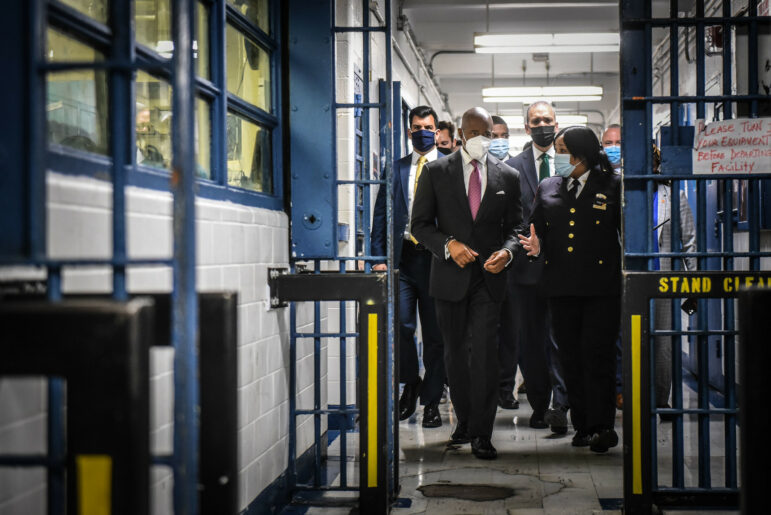“Despite the mayor’s repeated statements that he wants to fund more ‘upstream’ services that address the city’s mental health crisis, his agenda, instead, focuses on post-crisis points and increased law enforcement. To effectively address the city’s mental health crisis, the mayor must invest in more preventive and evidenced-based supports.”

Michael Appleton/Mayoral Photography Office
Mayor Eric Adams during a tour of Rikers in 2022.By now, most New Yorkers have become aware of a painful truth: our city is failing people with mental health needs. As staff of the Urban Justice Center Mental Health Project, we represent the more than 3,000 individuals who are incarcerated in New York City jails and diagnosed with a mental health concern.
Through this work to ensure that people who receive mental health treatment in jail are connected to services upon release, we see what happens when people cannot get the help they need in the community—they are funneled into Rikers, where their mental and physical health deteriorates. Since the start of the Adams administration, 22 people have died in the chaos and brutality of New York City jails. In the last month alone, two people died in mental health units, Rubu Zhao and Joshua Valles.
Lately, we’ve heard a surprising amount of agreement from policymakers and government officials across the ideological spectrum that treatment for mental health needs is more effective and appropriate than incarceration. The mayor (when interviewed by Errol Louis on January 27), the Department of Corrections commissioner (speaking in the March 23 City Council Preliminary Budget hearing), and even frontline correction officers (testifying to the Board of Correction) have said that jail is not the place for people with mental health concerns. Certainly, the Mental Health Project, our clients, and their families have known this for a long time.
Nevertheless, since the Adams administration, the number of people in Rikers diagnosed with a serious mental illness has increased by 36 percent, to now over 1,100 people. And the portion of the jail population with any mental health diagnosis stands at over 52 percent. The mayor (when interviewed by THE CITY on December 29, 2022) stood by Department of Correction predictions that the jail population will increase in the next year. But all New Yorkers should understand this clearly: increases in the jail population are not an inevitability, but a choice, and the wrong choice.
The warehousing of people with mental health needs is not a status quo we need to accept. In our report, Diversion Not Incarceration, we outlined five recommendations to get people out of jail and connected with the treatment and resources they need. In this year’s city budget, we face a pivotal opportunity to fund solutions that we all agree are needed, and we must take it.
The City Council introduced a Mental Health Roadmap that signaled they are serious about change. It calls for investments in supportive housing, mental health community treatment teams, crisis respite centers, clubhouses, and an overall expansion of healthcare resources that when implemented will finally start to address the decades long disinvestment from mental healthcare. The time to fund and implement that Roadmap is now.
Unfortunately, none of these crucial investments were included in the mayor’s proposed budget. Instead, Mayor Adams is proposing to hire over 1,000 more officers than people in DOC custody. The mayor chose to spare the DOC’s uniformed workforce from the vacancy reductions he applied to so many other agencies, even though the city has four times more correction officers per incarcerated person than the average U.S. correctional system. As we see from our work in the jails, those extraordinarily high staffing levels do not equate to better conditions, or even the provision of minimum standards, for people at Rikers.
Budgets show what we value. When the mayor announced his Mental Health Agenda in March, it touted $20 million dollars in new funding commitments. That is wildly insufficient to meet the scale and depth of need. It is also less than what DOC spends on overtime in just one month, according to the Independent Budget Office.
Our city faces a critical choice this month. Despite the mayor’s repeated statements that he wants to fund more “upstream” services that address the city’s mental health crisis, his agenda, instead, focuses on post-crisis points and increased law enforcement. To effectively address the city’s mental health crisis, the mayor must invest in more preventive and evidenced-based supports.
The mayor must fund supportive housing, community mental health treatment and supports, and alternatives to incarceration. With these investments, we can expect to see the number of people languishing in jails plummet, while the safety and well-being of our communities improve dramatically. Rikers is not serving our city, and it’s certainly not serving people with mental health conditions. But we know what would, and when we have the means to provide it, doing anything else is both foolish and immoral.
Jennifer J. Parish is director of criminal justice advocacy and Marco Barrios is criminal justice advocate with the Urban Justice Center Mental Health Project. MHP is a partner in the Campaign to Close Rikers.








